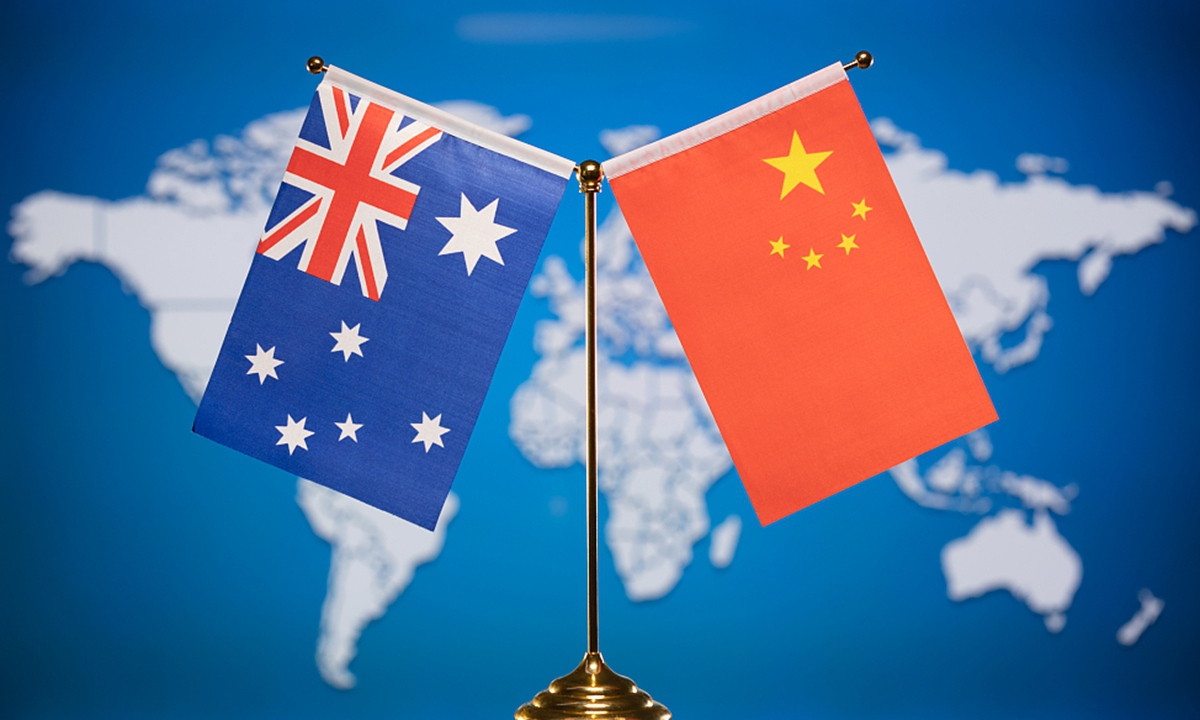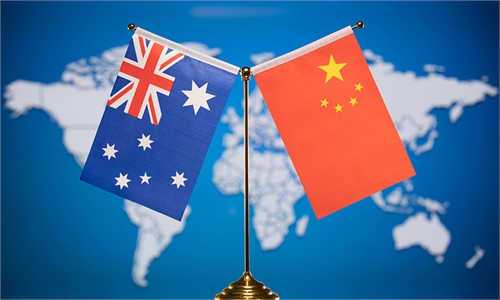China-Australian business representatives look to tap business potential after high-level meeting
Industry players hope to tap stronger potential after high-level meeting

China Australia Photo: VCG
Business representatives and experts from China and Australia expressed excitement and high expectations for closer economic and trade ties amid positive signs for improving relations, after the sixth China-Australia Foreign and Strategic Dialogue in Beijing on Wednesday.
A full recovery of bilateral trade relations won't happen at the moment, but experts said that the meeting sent a clear message that both sides are ready to resolve problems and settle discrepancies in mending the damaged relations under the previous Australian government.
Chinese State Councilor and Foreign Minister Wang Yi and Australian Foreign Minister Penny Wong held the sixth China-Australia Foreign and Strategic Dialogue on Wednesday, during which both sides exchanged views on bilateral, regional and international issues of interest.
Meanwhile, the China-Australia Foreign and Strategic Dialogue Joint Outcomes Statement was released, in which both sides agreed to maintain high-level engagement, and to commence or restart dialogue in key areas including trade and economic issues, which have suffered historic drawbacks amid soured relations.
The meeting sent a ray of hope for Australian companies to re-enter the Chinese market, with a highly anticipated consumption rebound, following China's optimized epidemic control measures and policies.
Vaughn Barber, chairman of AustCham China, told the Global Times in an exclusive written interview on Thursday that AustCham and the broader Australian business community across China welcome the efforts by both sides to stabilize China-Australia relationship.
"As COVID restrictions are relaxed, AustCham is optimistic about the prospect of companies being able to resume normal business operations and anticipates that business executives will be able to visit China again. This will be positive for the continuing development of Australian business in China," Barber said.
Tim Ford, the CEO of Treasury Wine Estates, told the Global Times in a written interview on Thursday that it is pleased to see renewed engagement between Australia and China in recent months, including with Wednesday's meeting in Beijing.
"The meeting marks the milestone of the 50th anniversary of diplomatic relations between our two nations, the dialogue is encouraging, and we strongly support further diplomatic and business engagement across a range of matters where our countries have complementarities, including trade and economic issues," Ford said.
Ford's last visit to China was in 2019, and he looks forward to visiting again in 2023 and re-connecting with staff, customers and partners face-to-face.
China is the major destination market for the world's quality wine, including from Australia. While the share of Australian wine has significantly dropped in China after anti-dumping tariffs in late 2020, the significance of China's market remains to the Australian company.
"In recent years, we've been exploring the possibility of producing wine in China, and were pleased to launch our first China-produced Penfolds wine in September, using grapes sourced from the Ningxia region," Ford said.
Bilateral trade witnessed the lowest ebb in decades with most Australian goods losing share in China, as Chinese companies looked at alternatives to reduce risk of excessive dependence.
For example, Australian coal imports in China in 2021 fell 66.37 million tons from 2020, a drop of more than 85 percent year-on-year, amid soured relations between China and Australia, industry insiders said.
An employee with a large domestic steel company told the Global Times on Wednesday that while importing Australian coal will be a good thing as it may reduce high production and transportation costs, domestic production together with other imports can meet the current domestic demand for coal.
Imported coal is now taking less than 20 percent of the domestic market, the person said.
Chen Hong, director of the Australian Studies Center at East China Normal University, told the Global Times on Thursday that after the foreign ministers' meeting, talks regarding bilateral economic and trade relations would restart.
It's not just the Australian side that hopes to see changes. China also has its concerns, which need to be properly responded to and handled. For example, many Chinese companies' investment proposals were disrupted or blocked by the Australian government over the far-fetched "national security" allegation, which was obstructive to the healthy development of bilateral relations, Chen said.
"But as long as both sides have the readiness and preparedness to settle such discrepancies, most of the problems can be solved," Chen said.
Improving the bilateral relationship itself has been a top-down process after the Bali G20 summit of the two countries' leaders in November, so the momentum itself is strong and huge, the expert said, predicting that the two sides will find more potential for cooperation including in some new areas such as the green economy and clean energy, where China and Australia have strong complementarity.
Other areas such as tourism and international education also have potential, as China is optimizing its COVID control measures.
"I believe that bilateral trade will not only be able to recover but also expand next year," Chen said.

